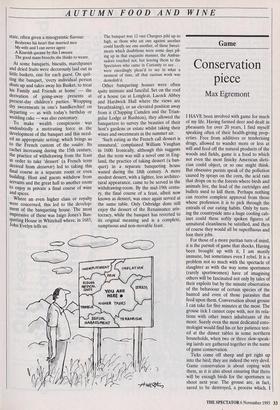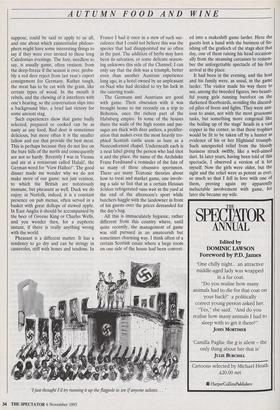Game
Conservation piece
Max Egremont
I HAVE been involved with game for much of my life. Having farmed deer and dealt in pheasants for over 20 years, I find myself speaking often of their health-giving prop- erties. Free from additives or tenderising drugs, allowed to wander more or less at will and feed off the natural products of the woods and fields, game is a food to which not even the most finicky American dieti- cian could object, or so one might think But obsessive purists speak of the pollution caused by sprays on the corn, the acid rain that drops on to the forests where birds and animals live, the lead of the cartridges and bullets used to kill them. Perhaps nothing can receive complete approval from those whose profession it is to pick through the entrails of our eating habits. Only by turn- ing the countryside into a huge cooling cab- inet could these softly spoken figures of unnatural cleanliness be satisfied, and then of course they would all be superfluous and lose their jobs.
For those of a more puritan turn of mind, it is the pursuit of game that shocks. Having been brought up with it, I am mostly immune, but sometimes even I rebel. It is a problem not so much with the spectacle of slaughter as with the way some sportsmen (rarely sportswomen) have of imagining others will be fascinated not only by tales of their exploits but by the minute observation of the behaviour of certain species of the hunted and even of those parasites that feed upon them. Conversation about grouse I can take for five minutes at the most. The grouse tick I cannot cope with, nor its rela- tions with other insect inhabitants of the moor. Surely even the most dedicated ento- mologist would find his or her patience test- ed at the dinner tables in some northern households, when two or three slow-speak- ing lairds are gathered together in the name of game conservation.
Ticks come off sheep and get right up into the bird; they are indeed the very devil. Game conservation is about coping with them, as it is also about ensuring that there will be enough birds for the sportsmen to shoot next year. The grouse are, in fact, saved to be destroyed, a process which, I
AUTUMN FOOD AND WINE
suppose, could be said to apply to us all, and one about which existentialist philoso- phers might have some interesting things to say if they were ever invited to these long Caledonian evenings. The fare, needless to say, is usually game, often venison; from the deep-freeze if the season is over, proba- bly a red deer reject from last year's export consignment for Germany. Rather tough, the meat has to be cut with the grain, like certain types of wood. In the mouth it rebels, and the chewing of it interferes with one's hearing, so the conversation slips into a background blur, a brief last victory for some ancient stag.
Such experiences show that game badly selected, prepared or cooked can be as nasty as any food. Red deer is sometimes delicious, but more often it is the smaller fallow and roe that provide the best meat. This is perhaps because they do not live on the bare hills of the north and consequently are not so hardy. Recently I was in Vienna and ate at a restaurant called Halali!, the German word for 'View Halloo!'. The good dinner made me wonder why we do not make more of our game: not just venison, to which the British are notoriously immune, but pheasant as well. Duck we do enjoy; in Norfolk, indeed, it is a constant presence on pub menus, often served in a basket with great dollops of stewed apple. In East Anglia it should be accompanied by the beer of Greene King or Charles Wells, and you wonder then, for a euphoric instant, if there is really anything wrong with the world.
Pheasant is a different matter. It has a tendency to go dry and can be stringy in casseroles, stiff with bones and tendons. In France I had it once in a stew of such suc- culence that I could not believe this was the species that had disappointed me so often in the past. The addition of herbs may have been its salvation, or some delicate season- ing unknown this side of the Channel; I can only say that the dish was a triumph, better even than another Austrian experience long ago, in a hotel owned by an unpleasant ex-Nazi who had decided to try his luck in the catering trade.
The Germans and Austrians are good with game. Their obsession with it was brought home to me recently on a trip to Bohemia, once the richest part of the Habsburg empire. In some of the houses there the walls of the high rooms and pas- sages are thick with deer antlers, a prolifer- ation that makes even the most heavily tro- phied Scottish castle seem as bare as a Nonconformist chapel. Underneath each is a neat label giving the person who had shot it and the place, the name of the Archduke Franz Ferdinand a reminder of the fate of so many of these obsessive sportsmen. There are many Teutonic theories about how to treat and market game, one involv- ing a sale so fast that in a certain Hessian Schloss refrigerated vans wait in the yard at the end of the afternoon's sport while butchers haggle with the landowner in front of his guests over the prices demanded for the day's bag.
All this is immaculately hygienic, rather different from this country where, until quite recently, the management of game was still pursued in an amateurish but sometimes charming way. I think often of a certain Scottish estate where a large room on one side of the house had been convert- 'I just thought I'd tly running it up the flagpole to see if anyone salutes,. ed into a makeshift game larder. Here the guests lent a hand with the business of fin- ishing off the gralloch of the stags shot that day, one of them raising his head occasion- ally from the steaming carcasses to remem- ber the unforgettable spectacle of his first arrival at the place. It had been in the evening, and the host and his family were, as usual, in the game larder. The visitor made his way there to see, among the tweeded figures, two beauti- ful young girls running barefoot on the darkened floorboards, avoiding the discard- ed piles of livers and lights. They were anx- ious to assist, not with the most gruesome tasks, but something more congenial like the boiling up of the stags' heads in a vast copper in the corner, so that these trophies would be fit to be taken off by a hunter as evidence of his or her Highland triumph. Such unexpected relief from the bloody business struck swiftly, like a well-aimed dart. In later years, having been told of this spectacle, I observed a version of it for myself. Now the girls were older, but the sight and the relief were as potent as ever, so much so that I fell in love with one of them, proving again my apparently ineluctable involvement with game, for later she became my wife.











































































 Previous page
Previous page